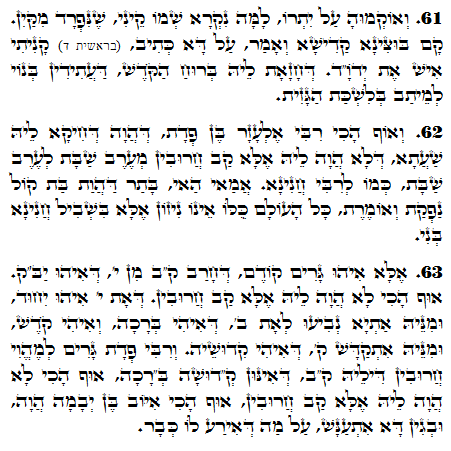Daily Zohar # 1092 – Pinchas – Be happy
Click here to listen to the Daily Zohar [audio:https://dailyzohar.com/wp-content/uploads/pinchas/audio/dp-1092.mp3|titles=Daily Zohar 1092]
Mobile devices, please touch here

Hebrew translation:
62. וְגַם כָּךְ רַבִּי אֶלְעָזָר בֶּן פְּדָת, שֶׁהָיְתָה דְחוּקָה לוֹ הַשָּׁעָה, שֶׁלֹּא הָיָה לוֹ אֶלָּא קַב חָרוּבִים מֵעֶרֶב שַׁבָּת לְעֶרֶב שַׁבָּת, כְּמוֹ לְרַבִּי חֲנִינָא. לָמָּה זֶה? לְאַחַר שֶׁיָּצְאָה בַּת קוֹל וְאוֹמֶרֶת: כָּל הָעוֹלָם כֻּלּוֹ אֵינוֹ נִזּוֹן אֶלָּא בִּשְׁבִיל חֲנִינָא בְּנִי.
63. אֶלָּא הוּא גָּרַם קֹדֶם שֶׁהֶחֱרִיב קַ”ב מִן י’, שֶׁהוּא יַבֹּ”ק. גַּם כָּךְ לֹא הָיָה לוֹ אֶלָּא קַב חָרוּבִים, שֶׁאוֹת י’ הִיא יִחוּד, וּמִמֶּנָּה בָּאָה נְבִיעָה לָאוֹת ב’, שֶׁהִיא בְּרָכָה, וְהִיא קֹדֶשׁ, וּמִמֶּנָּה מִתְקַדֵּשׁ ק, שֶׁהִיא קֹדֶשׁ. וְרַבִּי אֶלְעָזָר בֶּן פְּדָת גָּרַם לִהְיוֹת חָרוּבִים שֶׁלּוֹ קַ”ב, שֶׁהֵם קְ”דֻשָּׁה בְּ”רָכָה. גַּם כָּךְ לֹא הָיָה לוֹ אֶלָּא קַב חָרוּבִים. גַּם כָּךְ אִיּוֹב בֶּן יְבָמָה הָיָה, וּמִשּׁוּם זֶה נֶעֱנַשׁ עַל מַה שֶּׁכְּבָר אֵרַע לוֹ.
Pinchas 61-63
Rabbi Elazar ben Pedat was a sage whose teaching is quoted in the Talmud. Read more about him in Daily Zohar #771 . He was very poor and used to eat a small portion of carobs “קב חרובים” during the week. The word for ‘carob’ חרוב also means ‘dry’.
Why was he like this and what was his Tikkun?
The numerical value of YHVH + ELHYM, אלהים + יהוה is 112, יקב. These names represent Right and Left that we bring together with our spiritual connections.
The initials of יבק are י for יחוד – Unification, ק for קדושה – Kedusha (holiness) and ב for ברכה – Blessing.
The Zohar explains that in his previous life, Rabbi Pedat didn’t have proper spiritual connection and disconnected the י of Unification from the Kedusha and Blessing. Because of that he had to become poor and make a correction by eating קב (portion) of dry Carobs a week.
As we learn from his life’s story, he corrected himself and was able to become a great channel of light and miracles.
Rabbi Pedat didn’t stop to complain why he was poor and lacked the basic necessities in life. He was focused on making spiritual connections and helping others. At one time he even fainted because of hunger and God revealed himself to him. Read the full story in DZ 771.
The lesson of this teaching of the Zohar is that we should never complain about the state we are in because we brought it on ourselves in this life or from previous lives.
We should be happy about our life because with his infinite love, God helps us to cleanse our vessels from impurities, complete the Tikkun and merit the Final Redemption.
{||}

 Previous: Pinchas
Previous: Pinchas

